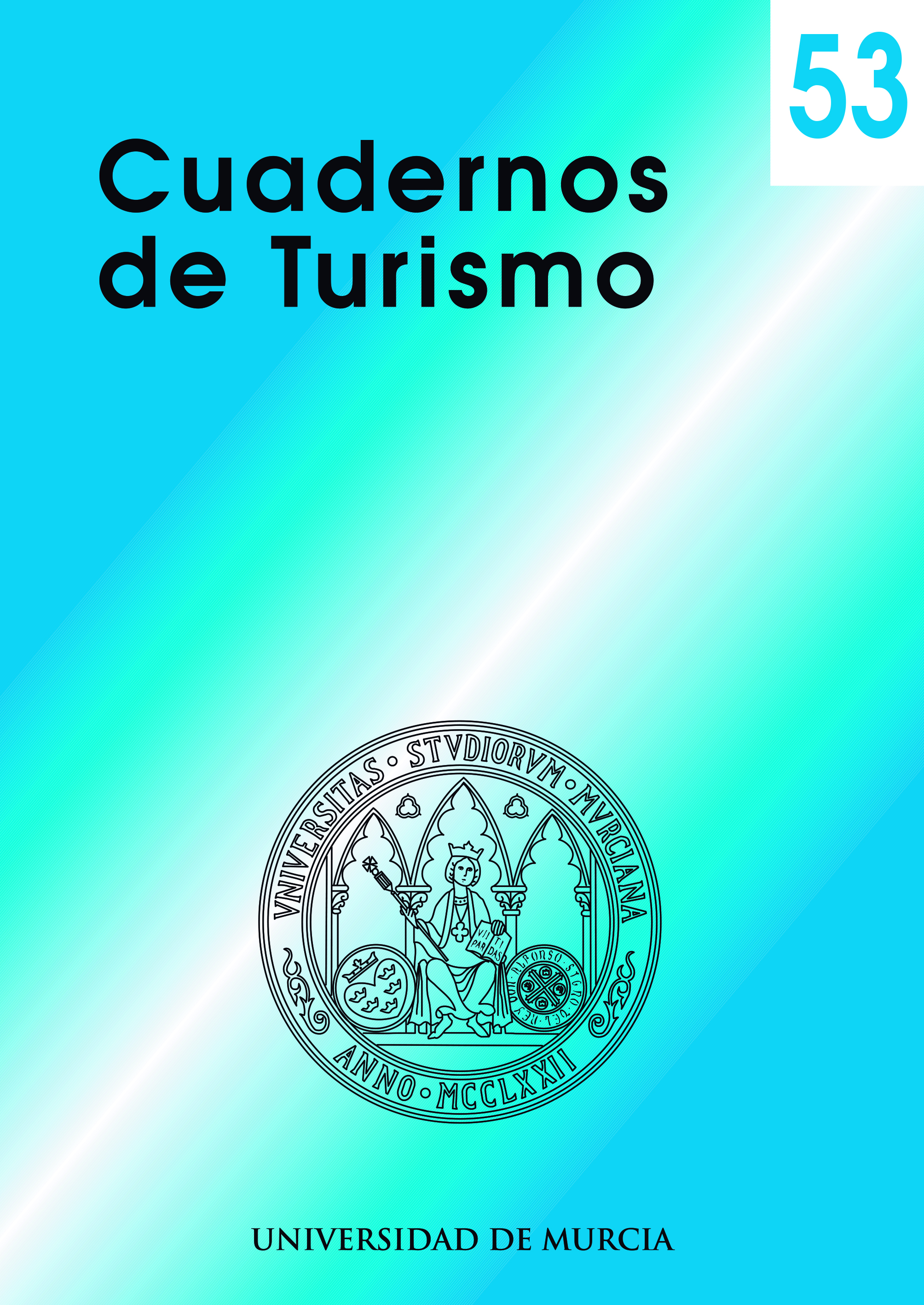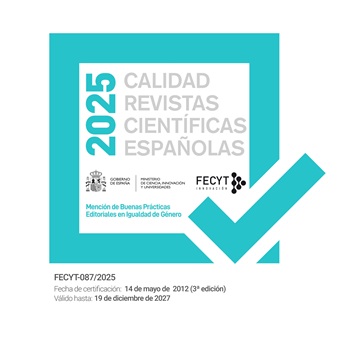INTELIGENCIA ARTIFICIAL (IA) EN TURISMO SOSTENIBLE: ANÁLISIS BIBLIOMÉTRICO
Agencias de apoyo
- This study was conducted at the University of Granada and supported by the Department of Business Organization I.
Resumen
La Inteligencia Artificial (IA) ha ganado atención en el turismo, que requiere su sostenibilidad. Nuestro estudio se centra en un análisis bibliométrico de la IA en el turismo sostenible utilizando 174 manuscritos de 2000 a 2022. Una de las principales conclusiones es que "inteligencia" aparece con frecuencia, seguida de términos relacionados como trabajo, rendimiento, recursos, sostenibilidad, impacto, optimización y gestión. No existen pruebas previas sobre la IA en el contexto del turismo sostenible que expliquen cómo los gestores públicos o los políticos diseñan políticas públicas para crear y mejorar la eficiencia de los recursos.
Descargas
-
Resumen3492
-
PDF 2218
-
PDF2218
Citas
ALONSO, M. (2019): «Robots, inteligencia artificial y realidad virtual: Una aproximación en el sector del turismo», Cuadernos de Turismo, nº 44, pp. 13-26. https://doi.org/10.6018/turismo.44.404711
AMAR, S., HERMOSA, P. and BALLESTA, G. (2023): «El papel de las instituciones políticas en el desarrollo turístico a través del emprendimiento. marco jurídico actual y análisis bibliométrico», PASOS. Revista de Turismo y Patrimonio Cultural, vol. 21 (3), pp. 461-472. https://doi.org/10.25145/j.pasos.2023.21.031
ASIF, M. and FAZEL, H. (2024): «Digital technology in tourism: a bibliometric analysis of transformative trends and emerging research patterns», Journal of Hospitality and Tourism Insights. http://dx.doi.org/10.1108/JHTI-11-2023-0847
BORRÀS, J., MORENO, A. and VALLS, A. (2014): «Intelligent tourism recommender systems: A survey», Expert Systems with Applications, vol. 41 (16), pp. 7.370-7.389. http://dx.doi.org/10.1016/j.eswa.2014.06.007
BOWEN J. and MOROSAN. C. (2018): «Beware hospitality industry: The robots are coming», Worldwide Hospitality and Tourism Themes, vol. 10 (6), pp. 726-733. https://doi.org/10.1108/WHATT-07-2018-0045
BOYD, R. and HOLTON, R. (2018): «Technology innovation, employment and power: Does robotics and artificial intelligence really mean social transformation? », Journal of Sociology, vol. 54 (3), pp. 331-345. https://doi.org/10.1177/1440783317726591
BUHALIS, D. (2020): «Technology in tourism-from information communication technologies to eTourism and smart tourism towards ambient intelligence tourism: A perspective article», Tourism Review, vol. 75 (1), pp. 267-272. https://doi.org/10.1108/TR-06-2019-0258
BULCHAND-GIDUMAL, J. (2020): «Impact of artificial intelligence in travel, tourism, and hospitality» en Handbook of e-Tourism. Cham: Springer International Publishing, pp. 1943-1962. https://doi.org/10.1007/978-3-030-05324-6_110-1
CAPUTO, A., PIZZI, S., PELLEGRINI, M. and DABIC, M. (2021): «Digitalization and business models: Where are going? A science map of the field», Journal of Business Research, vol. 123, pp. 489-501. https://doi.org/10.1016/j.jbusres.2020.09.053
CASTELEIRO-ROCA, J.L., GÓMEZ-GONZÁLEZ, J.F., CALVO-ROLLE, J.L., JOVE, E., QUINTIÁN, H., GONZALEZ DIAZ, B. and MENDEZ PEREZ, J. A. (2019): «Short-term energy demand forecast in hotels using hybrid intelligent modeling», Sensors, vol 19 (11), pp. 2485.
CHI O. H., DENTON G. and GURSOY, D. (2020): «Artificially intelligent device use in service delivery: A systematic review, synthesis, and research agenda», Journal of Hospitality Marketing and Management, vol. 29 (7), pp. 757-786. https://doi.org/10.1108/WHATT-07-2018-0045
CHI, O.H., GURSOY, D. and CHI, C.G. (2022): «Tourists’ attitudes toward the use of artificially intelligent (AI) devices in tourism service delivery: Moderating role of service value seeking», Journal of Travel Research, vol. 61 (1), pp. 170-185. https://doi.org/10.1177/0047287520971054
COBO, M., LÓPEZ-HERRERA, A., HERRERA-VIEDMA, E. and HERRERA, F. (2011): «An approach for detecting, quantifying, and vializing the evolution of a research field: A practical application to the fuzzi sets theory field», Journal of Informetrics, vol. 5 (1), pp. 146-166. https://doi:10.1016/j.joi.2010.10.002
DENG, N. and LI, X. (. (2018): «Feeling a destination through the “right” photos: A machine learning model for DMOs’ photo selection», Tourism Management, no 65, pp. 267-278. https://doi:10.1016/j.tourman.2017.09.010
DZIURAKH, Y., KULYNIAK, I., HALANETS, V., DZYANA, H. and DZYANYY, R. (2024): «Use of artificial intelligence in smart tourism: Bibliometric analysis», en E3S Web of Conferences. EDP Sciences, vol. 501, pp. 01002.
GO, H. and KANG, M. (2023): «Metaverse tourism for sustainable tourism development: Tourism agenda 2030», Tourism Review, vol 78 (2), pp. 381-394. https://doi.org/10.1108/TR-02-2022-0102
HONGDAO, Q., BIBI, S., KHAN, A., ARDITO, L. and KHASKHELI, M.B. (2019): «Legal technologies in action: The future of the legal market in light of disruptive innovations», Sustainability, no 11(4), pp. 1015. https://doi.org/10.3390/su11041015
HUANG, M.H. and RUST, R. T. (2018): «Artificial intelligence in service», Journal of Service Research, vol. 21 (2), pp. 155-172.
HUNTER, W.C., CHUNG, N., GRETZEL, U. and KOO, C. (2015). «Constructivist research in smart tourism», Asia Pacific Journal of Information Systems, vol. 25 (1), pp. 103-118.
INTERNATIONAL FEDERATION OF ROBOTICS. IFR. (2021): World robotics industrial robots 2021», Executive Summary. Disponible en https://ifr.org/img/worldrobotics/Executive_Summary_WR_Industrial_Robots_2021.pdf
IVANOV, S. and WEBSTER, C. (2019): Robots, artificial intelligence, and service automation in travel, tourism and hospitality. Emerald Publishing Limited.
IVANOV, S., WEBSTER, C. and BEREZINA, K. (2017): «Adoption of robots and service automation by tourism and hospitality companies», Revista Turismo and Desenvolvimiento, vol. 27, pp. 1.501-1.571.
KAUFFMAN, R.J., KIM, K., LEE, S.Y.T., HOANG, A.P. and REN, J. (2017): «Combining machine-based and econometrics methods for policy analytics insights», Electronic Commerce Research and Applications, vol. 25, pp. 115-140.
KAZAK, A., CHETYRBOK, P. and OLEINIKOV, N.N. (2020): «Artificial intelligence in the tourism sphere» en The International Conference on Green Development and Environmental Science and Technology, vol. 421, nº 4.
KELLY, S., KAYE, S.A. and OVIEDO-TRESPALACIOS, O. (2023): «What factors contribute to the acceptance of artificial intelligence? A systematic review», Telematics and Informatics, vol. 77, pp. 101925.
KOO, C., GRETZEL, U., HUNTER, W.C. and CHUNG, N. (2015): «The role of IT in tourism», Asia Pacific Journal of Information Systems, vol. 25 (1), pp. 99-102.
LI, J., BONN, M.A. and YE, B.H. (2019): «Hotel employee's artificial intelligence and robotics awareness and its impact on turnover intention: The moderating roles of perceived organizational support and competitive psychological climate», Tourism Management, vol. 73, pp. 172-181. https://doi.org/10.1016/j.tourman.2019.02.006
MARR, D. (1977): «Artificial intelligence—A personal view», Artificial Intelligence, vol. 9 (1), pp. 37-48. https://doi:10.1016/0004-3702(77)90013-3
MCCARTHY, J. (2007): What is artificial intelligence?. https://www.diochnos.com/about/McCarthyWhatisAI.pdf
NEUHOFER, B., BUHALIS, D. and LADKIN, A. (2014): «A typology of technology enhanced experiences», International Journal of Tourism Research, vol. 16 (4), pp. 340-350. http://dx.doi.org/10.1002/jtr
PAGE, M., MCKENZIE, J., BOSSUYT, P., BOUTRON, I., HOFFMANN, T., MULROW, C., SHAMSEER, L., TETZLAFF, J. AKL, E., BRENNAN, S., CHOU, R., GLANVILLE, J., GRIMSHAW, J., HRÓBJARTSSON, A., LALU, M., LI, T., LODER, E., MAYO-WILSON, E., MCDONALD, S. and MOHER, D. (2021): «Prisma 2020 statement: An updated guideline for reporting systematic reviews», BMI, vol. 372. https://doi.org/10.1136/bmj.n71
PARK, E. (2020): «User acceptance of smart wearable devices: An expectation-confirmation model approach», Telematics and Informatics, vol. 47, pp. 2-11. https://doi.org/10.1016/j.tele.2019.101318
RANE, N., CHOUDHARY, S. and RANE, J. (2023): “Sustainable tourism development using leading-edge Artificial Intelligence (AI), Blockchain, Internet of Things (IoT), Augmented Reality (AR) and Virtual Reality (VR) technologies”. Blockchain, Internet of Things (IoT), Augmented Reality (AR) and Virtual Reality (VR) technologies. https://dx.doi.org/10.2139/ssrn.4642605
ROMAGOSA, F., MENDOZA, C., MOJICA, L. and MORÉN ALEGRET, R. (2020): «Inmigración internacional y turismo en espacios rurales. El caso de los “micropueblos” de Cataluña», Cuadernos de Turismo, nº 46, pp. 319 347. https://doi.org/10.6018/turismo.451861
RUSSELL, S. and NORVIG, P. (1995): Artificial intelligence: A modern approach. Prentice Hall.
SACCO, P.L., FERILLI, G. and TAVANO BLESSI, G. (2018). From culture 1.0 to culture 3.0: Three socio-technical regimes of social and economic value creation through culture, and their impact on European Cohesion Policies», Sustainability, vol. 10 (11), pp. 3923.
SERGE, J.P.R. and BRITZ, P.J. (2009): «Profile of the illegal abalone fishery (Haliotis midae) in the eastern cape province, south africa: organised pillage and management failure». Fisheries Research, vol. 97(3), pp. 183-195.
TIRKOLAEE, E. B., GOLI, A., GHASEMI, P., and GOODARZIAN, F. (2022): «Designing a sustainable closed-loop supply chain network of face masks during the COVID-19 pandemic: Pareto-based algorithms», Journal of Cleaner Production, vol. 333, pp. 130056.
TOWNSEND, P. (2017): The dark side of technology. Oxford University Press, Oxford.
TUSSYADIAH, I. (2020): «A review of research into automation in tourism: Launching the Annals of Tourism Research Curated Collection on Artificial Intelligence and Robotics in Tourism», Annals of Tourism Research, vol. 81, pp. 102883.
UNITED NATIONS WORLD TOURISM ORGANIZATION. UNWTO. (2023): «Glossary of tourism terms». Disponible en https://www.unwto.org/es/glosario-terminos-turisticos.
UNITED NATIONS. and DEPARTMENT OF ECONOMIC AND SOCIAL AFFAIRS SUSTAINABLE DEVELOPMENT. (2023): «Sustainable tourism». Disponible en https://sdgs.un.org/topics/sustainable-tourism#:~:text=The%20World%20Tourism%20Organization%20defines,the%20environment%20and%20host%20communities%22.
VALSARAJ, P., GIRIDHAR, B., VVASANTH, K., JYOTHI, M. and C. (2024): «Trends and patterns in indian sustainable tourism development literature: A bibliometric analysis and visualisation», International Journal of Tourism Policy, vol. 12 (2), pp. 188-206. https://doi.org/10.1504/IJTP.2024.137155
VAN ECK, N. and WALTMAN, L. (2010): «Software survey: VOSviewer, a computer program for bibliometric mapping», Scientometrics, vol. 84, pp. 523-538. https://doi.org/10.1007/s11192-009-0146-3
WANG, R., LUO, J. and HUANG, S. S. (2020): «Developing an artificial intelligence framework for online destination image photos identification», Journal of Destination Marketing and Management, vol. 18, pp. 100512. https://doi.org/10.1016/j.jdmm.2020.100512
WEI, A. P., PENG, C. L., HUANG, H. C. and YEH, S. P. (2020): «Effects of corporate social responsibility on firm performance: Does customer satisfaction matter? », Sustainability, no 12(18), pp. 7545.
ZENG, Z., CHEN, P. and LEW, A. (2020): «From high-touch to high-teach: COVID-19 drives robotics adoption», Tourism Geographies, vol. 22 (1), pp. 1-11. https://doi.org/10.1016/j.jdmm.2020.100512
ZHENG, W., HUANG, L. and LIN, Z. (2021): «Multi-attraction, hourly tourism demand forecasting», Annals of Tourism Research, vol. 90, pp. 103271. https://doi.org/10.1016/j.annals.2021.103271
Las obras que se publican en esta revista están sujetas a los siguientes términos:
1. El Servicio de Publicaciones de la Universidad de Murcia (la editorial) conserva los derechos patrimoniales (copyright) de las obras publicadas, y favorece y permite la reutilización de las mismas bajo la licencia de uso indicada en el punto 2.
2. Las obras se publican en la edición electrónica de la revista bajo una licencia Creative Commons Reconocimiento-NoComercial-SinObraDerivada 3.0 España (texto legal). Se pueden copiar, usar, difundir, transmitir y exponer públicamente, siempre que: i) se cite la autoría y la fuente original de su publicación (revista, editorial y URL de la obra); ii) no se usen para fines comerciales; iii) se mencione la existencia y especificaciones de esta licencia de uso.
3. Condiciones de auto-archivo. Se permite y se anima a los autores a difundir electrónicamente las versiones pre-print (versión antes de ser evaluada) y/o post-print (versión evaluada y aceptada para su publicación) de sus obras antes de su publicación, ya que favorece su circulación y difusión más temprana y con ello un posible aumento en su citación y alcance entre la comunidad académica. Color RoMEO: verde.





_.jpg)









